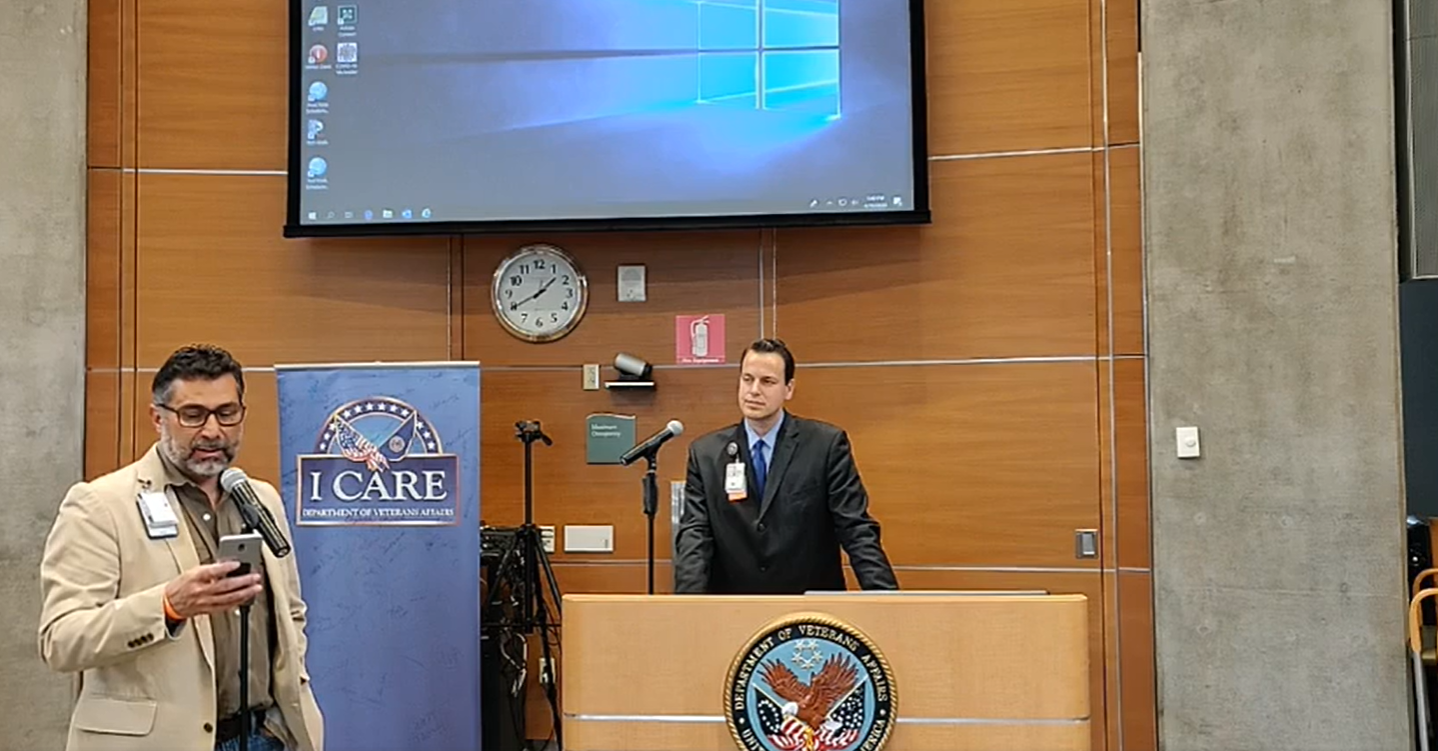Long Beach VA Holds Virtual Town Hall
by Kevin Flores | Published April 13, 2020 in Journalism
9 minute readLong Beach VA officials during a virtual town hall Friday ran through a litany of resources and protective measures that have been put in place to help veterans safely access healthcare services amid the COVID-19 crisis, including a new curbside prescription drop-off and pickup system.
Veterans seeking treatment at the medical center are having to navigate a “new normal,” Long Beach VA Director Walt Dannenberg acknowledged, but stressed that staff are trying to do everything possible to make things run smoothly.
“This is a very difficult time for all of us,” Dannenberg said. “But we thought it was prudent to have a town hall virtually and let you know everything that we’re doing here at the VA Long Beach Healthcare System to support you, and to make sure that you have access to the health care services that you deserve and earned through your service.”
The pandemic has forced the hospital to make some major changes to its operations, as staff and vets alike adapt to the new normal. Elective procedures have been cancelled and, when possible, virtual appointments are taking the place of in-person visits. Visitors have also been barred from the facility indefinitely; and starting today, the VA’s pharmacy began offering a curbside drop-off and pickup service.
Those who need to physically visit the facility will have to pass through one of the COVID-19 screening stations at each VA entrance, where both employees and veterans are being asked if they’ve experienced a recent fever, cough, or have felt shortness of breath.
As of Saturday, 10 inpatients and 23 outpatients at the Long Beach VA have tested positive for COVID-19, according to the U.S. Department of Veterans Affairs. A “very small number” of staff have also tested positive, Dannenberg said during the town hall, though he did not give a specific number.
VA Clinical Psychologist Dr. Lia Kraemer said that the upheaval and isolation resulting from the pandemic can trigger post-traumatic stress, anxiety, and other psychological issues, but assured veterans that mental health services were still being provided, albeit with some changes.
“The best way to get in touch with us is virtually. If you already have a mental health provider and you’re feeling like you need some support right now, as many of us do, or you have ongoing treatment, don’t stop that right now. We want to keep it going,” said Kraemer. “If you don’t already have an appointment, reach out to your mental health team either via phone or My HealtheVet and get that connection going.”
Another adjustment vets may encounter is the suspension of in-person hearings before the Board of Veterans’ Appeals.
However, Regional Director of the Veterans Benefits Administration Emmett O’Meara said that the hearings will be conducted “in an informal or potentially video manner until the crisis passes.”
O’Meara also said physical examinations related to claims for veteran compensation have been stopped temporarily but that claims won’t be denied simply because an exam can’t be scheduled.
“If that’s the sole reason, that’ll just have to remain pending,” he said.
In other cases, decisions will be based on “the evidence already available to us to make the best decision possible.”
Below are some of the questions asked by the audience over Facebook with answers from either Dannenberg or Long Beach VA spokesperson Richard Beam. Answers and questions have been edited for brevity and clarity. The full virtual town hall can be viewed here.
Q: Does the VA have a crisis line for veterans who need to know how to get tested for COVID-19?
Dannenberg: We don’t have a specific crisis hotline for COVID-19, but we do have the nurse advice line, which would be a great initial step to see if you need to be tested; or contact your care team. The nurse advice line is 1-877-252-4866.
Q: If a person is tested for COVID-19, how long do they have to wait for the results?
Dannenberg: So we are the only VA basically on the west side of the country that has the testing capability for COVID-19. And that was a great development. So again, if you come here, and it turns out that you need to be tested, it’s not going to be a matter of weeks before we get to those results. We’re expected to have those results either the same day or the next day.
Q: Why is the VA’s mental health department not posting live videos for PTSD patients? I suggest meditation, yoga classes, therapists, lectures, calming music, etc.
Beam: So a few things: I’d say that our teams are doing as much as they can, online or using videos. But I think your suggestion that maybe using Facebook Live to do other things that are more therapeutic would be a great suggestion. So we will look to plan that and put something together. So look for that in the near future.
Tomisin Oluwole
Face the Music, 2022
Acrylic on canvas
24 x 36 inches
Click here to check out our interview with Tomisin Oluwole, a literary and visual artist based in Long Beach.

Instead of gunking up our site with ads, we use this space to display and promote the work of local artists.
Kraemer: I just wanted to say we have a PTSD group that is now up and running. I would reach out to your provider to request that. I really liked the suggestion about putting more resources on Facebook. I also want to encourage you to actually look at our Facebook videos, because archived we do have some videos on depression, managing stress, and some other information that’s already available.
Q: What is the Partnership In Effective Recovery program doing for homeless veterans?
Dannenberg: Our homelessness social worker is working tirelessly. There are a number of community resources available that they are aware of. So if you’re interested in knowing more about what those resources are, definitely connect with your social worker. I will say our footprint here, geographically, is very limited. So I know VA Greater Los Angeles Healthcare System (GLA) has a special structure and they’re working with the homeless program to allow for certain housing arrangements. You might want to look at their West Los Angeles campus as a possibility if you’re needing to find some additional resources as far as on site availability.
Q: Are all your caregivers healthy?
Beam: So we do have employees on our care team that are at home, self-quarantining under their doctor’s care because they currently are positive for COVID-19.
Dannenberg: We are doing everything we can to ensure that we have a healthy, safe workforce. When we talked about the screening criteria that’s not just for veterans, that’s for employees, we have a dedicated team from our occupational health service that’s there to support our employees and follow them through and make sure that they’re in touch with the appropriate health care individuals.
Q: I’m a retired RN. Who is the point of contact for those who might be interested in helping out?
Beam: If you look on our homepage at longbeach.va.gov, we have a link there that gives you an email that you can send your information to. And ideally, we can screen and look and see if you’d like to come back. And if you’re a good fit, we’ll bring you out of retirement.
Q: Los Angeles VA was reported to be short on safety supplies. Is Long Beach VA okay?
Beam: The answer is yes. We have the personal protective equipment that we need, we have the supplies that we need, but we are also going to stand ready to support another sister VA that might need supplies. So our inventory will ebb and flow every day because we want to take care of our staff, but also the veterans that live in LA, San Diego, and out towards Loma Linda. If they need us, we’re going to stand up, but our projection right now is that we’re going to be okay. And we’re all in this together. So as the supply chain catches up—and sometimes it slows down a bit—there’ll be a little bit of balancing going on, but we fully expect to be okay.
Q: Are visitors allowed in the cancer infusion center?
Beam: Context matters here. Visitors are not. If you’re a family member that is an aide to your veteran, meaning that your veteran needs help walking, needs help with directions, or maybe has cognition problems, we are allowing one family member to be the caregiver to our veterans to bring them into the facility and make sure they get where they need to be.
Q: Are the staff going to be tested for COVID-19?
Beam: We’re being careful with the testing. We’re not just testing randomly, but if there is a reason, meaning if we have staff that we expect or think or believe could have been exposed during the performance of their duties, we would test them to make sure that they’re safe to be here and to be at work. But I can’t say across the board; we are not testing everybody.
Dannenberg: We have tested hundreds of employees and we do have an algorithm to make sure that if someone has exposure or danger of having contracted COVID-19, we have that mechanism to be able to test them quickly to see if they have contracted COVID-19 or not.
Q: Will the VA use the U.S.S. Mercy just in case there’s a surge in patients?
Dannenberg: As of now, there are no current plans for VA to interface with the US Navy ship Mercy, but again, that could all change depending on what the future holds.
Q: Has the Long Beach VA experienced any COVID-19 deaths?
Beam: To my knowledge, I don’t think we have lost a patient to COVID-19, certainly no employees. So to our knowledge, we have no deaths yet.
Help Us Create An Independent Media Platform for Long Beach
We believe that what we are trying to do here is not only unique, but constitutes a valuable community resource. We are dedicated to building a fiercely independent, not-for-profit, and non-hierarchical media organization that serves Long Beach. Our hope is that such a publication will increase civic participation, offer a platform to marginalized voices, provide in-depth coverage of our vibrant art scene, and expose injustices and corruption through impactful investigations. Mainly, we plan to continue to tell the truth, and have fun doing it. We know all this sounds ambitious, but we’re on our way there and making progress every day.
Here’s what we don’t believe in: our dominant local media being owned by one of the city’s wealthiest moguls or a far-flung hedge fund. We believe journalism must be skeptical and provide oversight. To do so, a publication should remain free from financial conflicts of interest. That means no sugar daddy or mama for us, but also no advertisements. We answer to no one except to our readers.
We call ourselves grassroots media not only because we are committed to producing work that is responsive to you, dear reader, but because in order for this project to continue we will also need your support. If you believe in our mission, please consider becoming a monthly donor—even a small amount helps!


 kevin@forthe.org
kevin@forthe.org @reporterkflores
@reporterkflores




